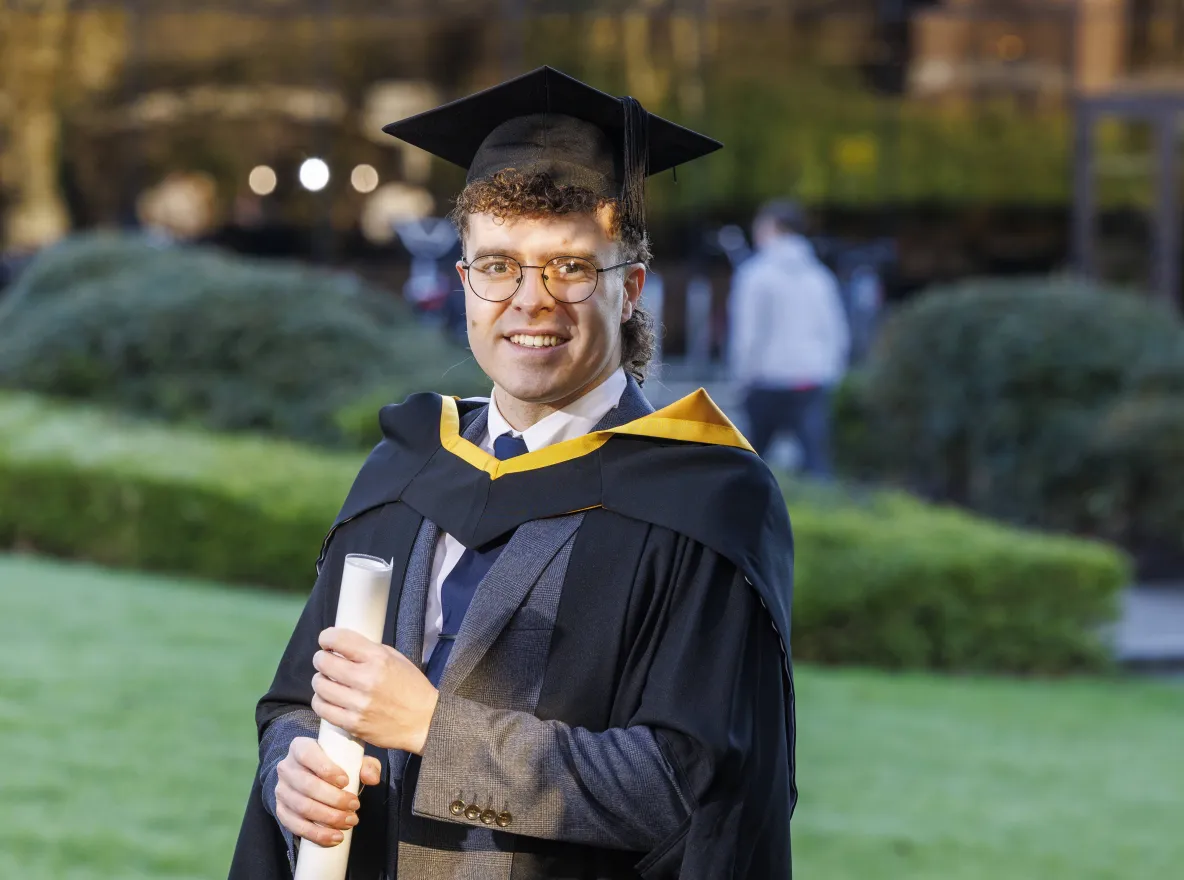
A new University of Limerick graduate who has been conferred with a Master’s Degree in Health Professions Education has advised his fellow students to take every opportunity to link what they learn to ‘real-world scenarios’.
Critical Care Dietitian Shane O’Connor from Killarney, County Kerry, graduated from the Master’s Degree in Health Professions Education, a course designed to empower health professionals such as doctors, nurses, physiotherapists and dietitians, like Shane, to provide education programmes and training in their respective fields.
After completing his undergraduate degree in Dublin, Shane took up a role as a dietitian at University Hospital Limerick, where teaching and mentoring were the aspects of the work that Shane enjoyed most.
“I loved all aspects of my job that involved teaching. I worked as an educator for student dietitians, and I also developed and managed an induction programme for newly recruited dietitians. I found it very rewarding to be passing on my knowledge to others.
“Working as a dietitian also involves a lot of patient education, and I decided that improving my knowledge and skills in education would be very worthwhile for my career,” he said.
This prompted Shane to seek out a course in this area and enrol in the MSc in Health Professions Education run by the School of Medicine at UL’s Faculty of Education and Health Sciences.
This two-year course is accredited by the Academy of Medical Educators and offered in two formats - blended or online - to allow busy healthcare professionals the flexibility to work around work commitments.
“Balancing course commitments with my job as a dietitian required deliberate planning and time management. I developed a consistent routine of blocking off the same times every week to devote to course work. Knowing the submission dates of all assignments well in advance was really beneficial for planning ahead,” Shane explained.
A year into his master’s, Shane decided to take a year off work to go travelling. The online learning option meant he could continue with his studies.
For his master’s thesis, he carried out original research on the graduate outcomes of dietetic graduates in Ireland. He also investigated how well-prepared graduates felt for employment.
“To develop a graduate profile, I collected information on things like their employment roles and rates of emigration. I also conducted interviews to determine if graduates felt suitably prepared for employment by their dietetic education.”
Shane hopes to publish his findings with a view to making them available to educational institutions and, in turn, inform the future direction of how dietetics courses are taught and structured in Ireland.
Shane is now working as a Senior Dietitian in the Critical Care Unit at Cork University Hospital (CUH). He works as part of a multidisciplinary team, looking after the nutritional needs of critically ill patients who cannot be fed orally.
“We see a lot of trauma patients - car accidents, falls from a height, people after a stroke or brain injury, or those with severe infections. It’s up to us to devise the most appropriate feeding regimen for them.”
At CUH, he continues to provide training, mentoring and clinical supervision to students on placement and junior dietitians, where he can implement the teaching strategies that were taught during his master’s.
“I am now much more confident in assessing learning needs and adapting my approach accordingly. I learned that one of the most important parts of being a leader is to be flexible to the case that’s in front of you.
“You need to recognise what style of learning a person has – some people are very practical - they want to be given a task, then go and see how they get on. Other people are real reflectors – they like to be given lots of information in advance, go away and read up on it, do it, and then ask for feedback.
“Rather than using one size fits all, we try to work out what works best for each person, what is the best way for them to learn and adapt our teaching to that.”
For Shane, the course has not only enhanced his ability to educate students, but also his colleagues in the multidisciplinary team.
“For example, today, I delivered a presentation to the rest of the multidisciplinary team, which includes doctors, nurses, physiotherapists, and speech and language therapists. I provided an update on protein requirements in the Critical Care Unit using the principles I learned as part of the master’s in terms of how to devise the teaching session and how to deliver it in the most effective way”, he said.
Looking ahead, Shane hopes to take up a more prominent role in student education and use his knowledge to make a meaningful impact on the next generation of dietitians. Reflecting on his career so far, he shared his own lessons in learning.
“I would advise students to make the most of the diverse backgrounds of their peers. This master’s is a great chance to learn from others in various healthcare roles, some of whom may have a wealth of experience in clinical education.
“I would also recommend that students take every opportunity to link the course content to real-world scenarios. Applying your learning to the work you are doing on a daily basis will deepen your understanding and make into easier to integrate the new knowledge into your practice,” he said.
“Building a strong network of colleagues and mentors to support you is invaluable when starting your career. The guidance of those who have navigated similar challenges is hugely insightful in accelerating your learning and provides you with a standard to aim for. Additionally, having a support system of peers to share ideas, seek advice, or even just talk through challenges can really help your professional development and self-confidence,” he concluded.